Headline News Archive

A new video shares the most up-to-date sea level rise projections for the United States, and encourages viewers to take some initial steps. The video highlights key takeaways from the 2022 Sea Level Rise Technical Report, with a focus on the impacts on coastal communities. Viewers are encouraged to consider actions they can take within their communities, and directed to existing web tools for assessing the timing and severity of local impacts from sea level rise.

A team of scientists found that carbon dioxide becomes a more potent greenhouse gas as more is released into the atmosphere.
The new study, led by scientists at the University of Miami Rosenstiel School of Marine, Atmospheric, Science, was published in Science and comes as world leaders meet in Dubai, United Arab Emirates, this week for the United Nations Climate Change Conference COP28.
 The Climate Innovation Challenge (CIC) cultivates student leaders who can think innovatively and communicate effectively about adapting to our changing climate. CIC is a free international STEAM program for grades 3-12 that guides students through the creation of climate change solutions while developing storytelling and video production skills. The program was developed by CAVU to challenge students to create unique ideas on adapting to increasing climate impacts like floods, fires, drought, rising temperatures, and sea-level rise. We encourage students to “think globally and adapt locally,” creating solutions to implement themselves in their communities. Learn more at ClimateInnovationChallenge.org!
The Climate Innovation Challenge (CIC) cultivates student leaders who can think innovatively and communicate effectively about adapting to our changing climate. CIC is a free international STEAM program for grades 3-12 that guides students through the creation of climate change solutions while developing storytelling and video production skills. The program was developed by CAVU to challenge students to create unique ideas on adapting to increasing climate impacts like floods, fires, drought, rising temperatures, and sea-level rise. We encourage students to “think globally and adapt locally,” creating solutions to implement themselves in their communities. Learn more at ClimateInnovationChallenge.org!
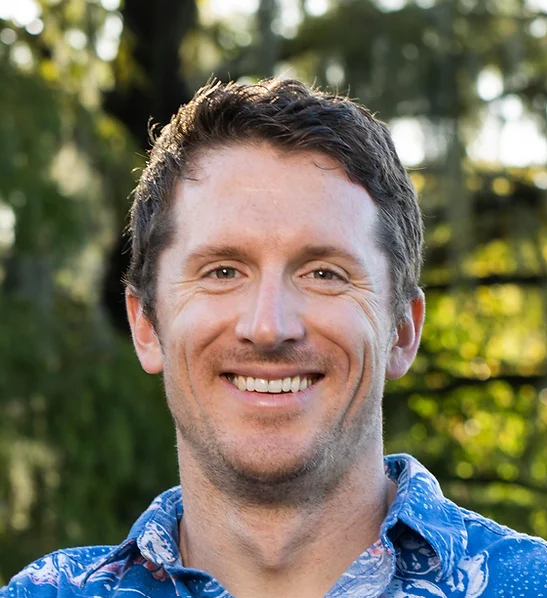 Congratulations to Dr. Brett Scheffers, Assistant Professor in the UF Department of Wildlife Ecology and Conservation, who has been named Florida Climate Institute Co-Director! Along with Dr. Sadie Ryan, Brett will co-lead the Florida Climate Institute at UF starting November 1. Many thanks to Dr. Rachata Muneepeerakul for his leadership over the past 3 years as the FCI has continued to grow and add programs.
Congratulations to Dr. Brett Scheffers, Assistant Professor in the UF Department of Wildlife Ecology and Conservation, who has been named Florida Climate Institute Co-Director! Along with Dr. Sadie Ryan, Brett will co-lead the Florida Climate Institute at UF starting November 1. Many thanks to Dr. Rachata Muneepeerakul for his leadership over the past 3 years as the FCI has continued to grow and add programs.
Read more about Dr. Scheffers here
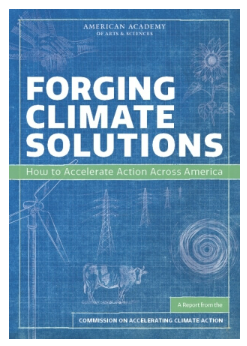 A new report from the Commission on Accelerating Climate Action at the American Academy of Arts & Sciences calls for a coordinated, cross-sector effort to combat climate change with five strategies and 21 recommendations rooted in justice, pragmatism, and accountability.
A new report from the Commission on Accelerating Climate Action at the American Academy of Arts & Sciences calls for a coordinated, cross-sector effort to combat climate change with five strategies and 21 recommendations rooted in justice, pragmatism, and accountability.
The report, Forging Climate Solutions: How to Accelerate Action Across America, was developed over a two-year period by a diverse commission of leaders sharing their expertise and priorities. The Commission’s report recommends how corporations, frontline communities, government, and environmental groups can work together to mobilize investments, build infrastructure, reduce emissions, and prepare for the impacts of climate change.
Led by Mustafa Santiago Ali (National Wildlife Federation), Christopher Field (Stanford), David G. Victor (University of California, San Diego, and the Brookings Institution), and Patricia Vincent-Collawn (PNM Resources), the commission’s expertise spans the arts, faith communities, environmental justice, youth activism, the natural and social sciences, Indigenous people and Indigenous Knowledge, public health, and urban design.
“Climate change is an existential challenge and addressing it will require us to build and sustain new kinds of coalitions,” said David Oxtoby, President of the American Academy. “The work is challenging but our Commission modeled how to connect across sectors and divides to take action. Our hope is that their work provides a roadmap for transcending ideological divisions to achieve tangible climate progress.”

The U.S. Department of Commerce’s Economic Development Administration (EDA) announced that the South Florida Climate Resilience Tech Hub, led by Miami-Dade County, has been designated as one of 31 Tech Hubs in the country, selected from a competitive pool of nearly 200 applicants across the United States and its territories. This designation will elevate and accelerate South Florida’s advances in climate action and resiliency, and unlocks access to tens of millions of dollars in potential funding. The Tech Hubs Program is a federal economic development initiative designed to drive regional technology and innovation-led growth by strengthening capacity to manufacture, commercialize, and deploy key climate technologies.
Read the full press release
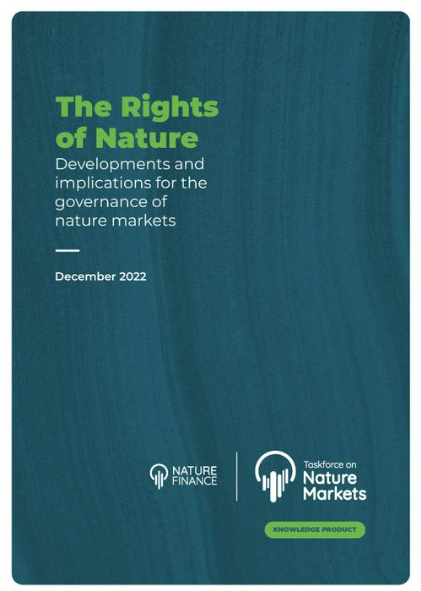
The Taskforce on Nature Markets, the initiative of NatureFinance (previously: Finance for Biodiversity Initiative – F4B), recently published this report with the objective of shaping a new generation of purposeful nature markets. Building on the Taskforce’s "The Future of Nature Markets" white paper, this document:
- responds to a rise in “nature markets” that explicitly monetize & trade nature,
- explores the developments in #environmental law & their implications, and
- aims to support the Taskforce in delivering its mandate: ensuring the global economy interfaces with nature in ways that deliver nature positive, equitable & #netzero outcomes.
Given the importance that legal frameworks, precedents, and measures play in the governance of nature markets, this paper covers three serious emerging environmental rights which sit at the intersection of nature, law, and human rights. This paper examines developments in environmental rights, with an overview of the right to a healthy environment and ecocide, and then delves deeper into the emergent rights of nature. This paper analyses the implications for nature markets and how they could be shaped by these rights.
WLRN 91.3 FM | By John Pacenti | Key Biscayne Independent
Published October 27, 2023 at 3:57 PM EDT
Scientists are looking at the latest advance in computer science — artificial intelligence to better predict mammoth hurricanes, raging wildfires and increased coastal flooding.
Professor Ben Kirtman at the University of Miami’s Rosenstiel school is leading the AI effort with three new federal grants totaling more than $3 million.
The grants are from the National Science Foundation and the National Oceanic and Atmospheric Administration (NOAA) and will be used to improve predictive analytics on three fronts.
A $750,000 grant will focus on coastal flooding in East Coast municipalities like Key Biscayne, aiming to give local communities long-term flood predictions that go beyond just anticipating hurricane storm surge

A new video shares the most up-to-date sea level rise projections for the United States, and encourages viewers to take some initial steps. The video highlights key takeaways from the 2022 Sea Level Rise Technical Report, with a focus on the impacts on coastal communities. Viewers are encouraged to consider actions they can take within their communities, and directed to existing web tools for assessing the timing and severity of local impacts from sea level rise.
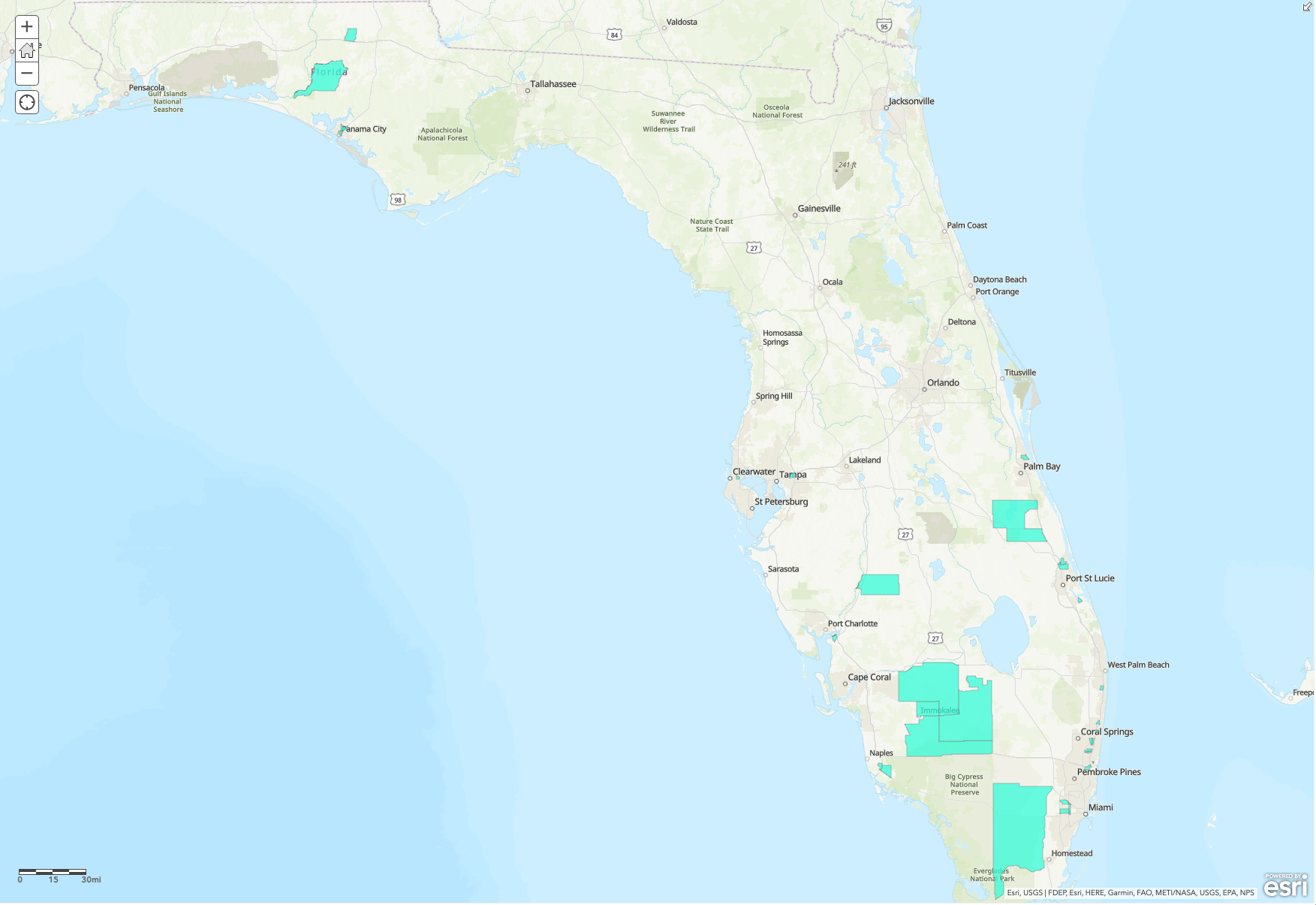 In September, FEMA announced an initial 483 census tracts nationwide that will be eligible for increased federal support to become more resilient to natural hazards and extreme weather worsened by the climate crisis – known as Community Disaster Resilience Zones (CDRZ). FEMA will use the CDRZ designations to direct and manage financial and technical assistance for resilience projects in these areas. The CDRZ designations identify communities most at risk of the effects of natural hazards and climate change using a tailored version of the National Risk Index that takes into consideration socioeconomic vulnerability as well as physical exposure and risk. An initial 32 CDRZ designations have been identified in Florida.
In September, FEMA announced an initial 483 census tracts nationwide that will be eligible for increased federal support to become more resilient to natural hazards and extreme weather worsened by the climate crisis – known as Community Disaster Resilience Zones (CDRZ). FEMA will use the CDRZ designations to direct and manage financial and technical assistance for resilience projects in these areas. The CDRZ designations identify communities most at risk of the effects of natural hazards and climate change using a tailored version of the National Risk Index that takes into consideration socioeconomic vulnerability as well as physical exposure and risk. An initial 32 CDRZ designations have been identified in Florida.
Read FEMA’s press release here. View an interactive map of all CDRZ designations here.
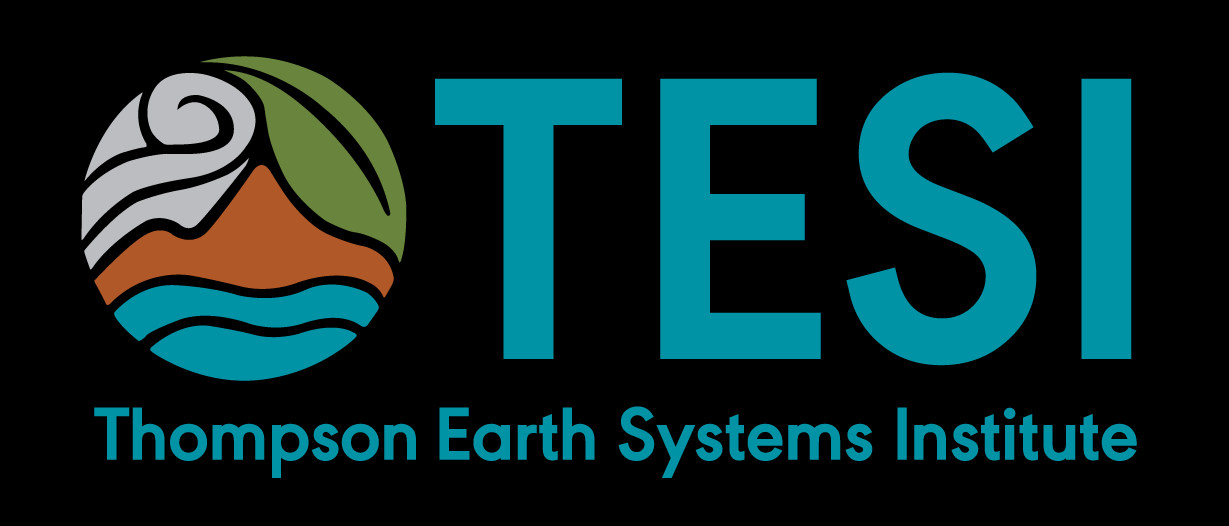 The University of Florida's Scientist in Every Florida School program within the Thompson Earth Systems Institute (TESI) is looking for scientists to join our database for virtual and in-person K-12 classroom visits to talk about their fields. We are interested in all field areas, but have a great need for the following at this time:
The University of Florida's Scientist in Every Florida School program within the Thompson Earth Systems Institute (TESI) is looking for scientists to join our database for virtual and in-person K-12 classroom visits to talk about their fields. We are interested in all field areas, but have a great need for the following at this time:
Astronomy- all space related fields
Physics- forces, motion, energy related fields
Chemistry- physical and chemical properties and changes in matter
Meteorology- climate, weather related fields
Climate Change related fields
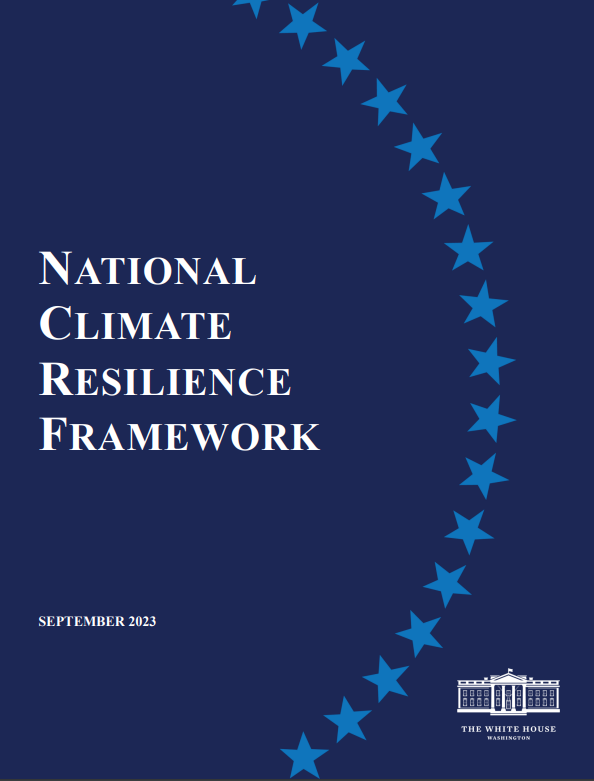 The White House’s new National Climate Resilience Framework outlines more than a dozen essential measures that help prepare the nation to adjust to the accelerating impacts of climate change.
The White House’s new National Climate Resilience Framework outlines more than a dozen essential measures that help prepare the nation to adjust to the accelerating impacts of climate change.
The impacts of a warming world are already being felt, and this year the United States has experienced a record number of billion-dollar climate and weather disasters, according to the National Oceanic and Atmospheric Administration.
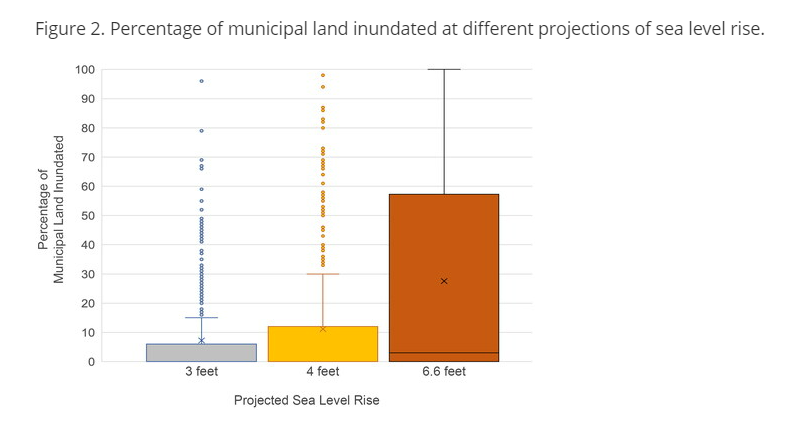 A new paper "Can Florida’s Coast Survive Its Reliance on Development?Fiscal Vulnerability and Funding Woes Under Sea Level Rise" is now out in JAPA, open access. How much will sea level rise will affect local government revenues in Florida? A LOT: 211 municipalities, $619 billion in assessed property values that currently contribute $2.36 billion. Some 64 municipalities have 50%+ of revenues sitting within 6.5 feet of current sea levels. We pair our spatial analysis with a statewide survey of coastal planners and show that there is no relationship between the level of fiscal risk & prioritization of adaptation planning.
A new paper "Can Florida’s Coast Survive Its Reliance on Development?Fiscal Vulnerability and Funding Woes Under Sea Level Rise" is now out in JAPA, open access. How much will sea level rise will affect local government revenues in Florida? A LOT: 211 municipalities, $619 billion in assessed property values that currently contribute $2.36 billion. Some 64 municipalities have 50%+ of revenues sitting within 6.5 feet of current sea levels. We pair our spatial analysis with a statewide survey of coastal planners and show that there is no relationship between the level of fiscal risk & prioritization of adaptation planning.
Big picture takeaways:
- fiscal risk from climate change is real but ignored
- fiscal policy - including reliance on property tax - constrains creative solutions
- market responses will likely result in resilient upland enclaves and vulnerable, poorer coastal towns.
What to do?
- recognize fiscal risk and assess it like we do with physical infrastructure and social vulnerability. We need a national fiscal climate risk dataset!
- enable regional land and revenue sharing. NH's SB285 allowing coastal towns to merge due to SLR is a start
- promote cooperative strategies like community land trusts and limited equity cooperative housing to help lower-income groups avoid displacement and adapt
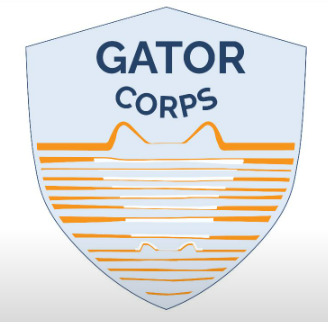 The University of Florida’s new AmeriCorps program, GatorCorps, is recruiting the first cohort of national service members!
The University of Florida’s new AmeriCorps program, GatorCorps, is recruiting the first cohort of national service members!
The program will open up opportunities (20+ funded positions per year f/t or p/t) for UF students and graduates to gain experience with Florida Institute for Built Environment Resilience partners in the field. GatorCorps members will extend and apply the resilience and risk reduction knowledge that has matured in UF in practical and service-oriented ways, furthering our research and education missions in front-line communities. We will be hiring student members to serve in Gainesville for 10-20 hours per week, with f/t graduate opportunities in Gainesville, Cedar Key, and Jacksonville.
Applications will be reviewed on a rolling basis until the program is full.

Are you a university-based, tenure-track researcher interested in and/or currently doing science communication? We invite you to participate in an exciting research study aimed at understanding how scientists construct identity and engage in public outreach. Your valuable insights will ultimately contribute to the development and support of scientist communicators nationwide.
Questions?
Contact Brenda Guerrero (
The full scope of Hurricane Idalia’s destruction is still coming into focus, but experts say one thing is clear: It could have been more like the damage wrought by Hurricane Ian had it hit anywhere else on the Florida coast. Professors Jeff Carney and Kathryn Frank spoke with CNN.
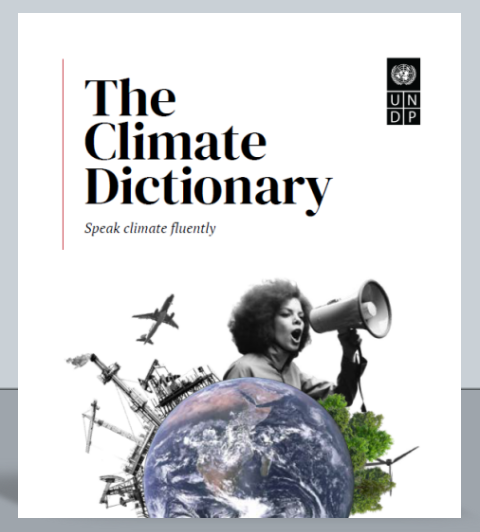 The United Nations Development Programme (UNDP) just published an excellent piece of work, “The Climate Dictionary: Speak Climate Fluently", defining 40 frequently used climate terms in a simple way, addressing the need for accurate, easy-to-understand information about climate change.
The United Nations Development Programme (UNDP) just published an excellent piece of work, “The Climate Dictionary: Speak Climate Fluently", defining 40 frequently used climate terms in a simple way, addressing the need for accurate, easy-to-understand information about climate change.
The dictionary defines important basic terminologies such as the distinction between weather and climate:
𝑾𝒆𝒂𝒕𝒉𝒆𝒓 “…refers to atmospheric conditions at a particular time in a particular location, including temperature, humidity, precipitation, cloudiness, wind, and visibility. Weather conditions do not happen in isolation, they have a ripple effect. The weather in one region will eventually affect the weather hundreds or thousands of kilometers away.”
𝑪𝒍𝒊𝒎𝒂𝒕𝒆 “…is the average of weather patterns in a specific area over a longer period of time, usually 30 or more years, that represents the overall state of the climate system.”
The dictionary goes beyond strictly climate change-related items, and also covers such terminologies like "blue economy" and "greenwashing".

Florida researchers have received $1.5 million from the Gulf Research Program of the National Academies of Sciences, Engineering, and Medicine to map climate change health burdens.
Florida State University is partnering with Colorado University Boulder and Tulane University to identify climate change and health disparities along the Gulf Coast.
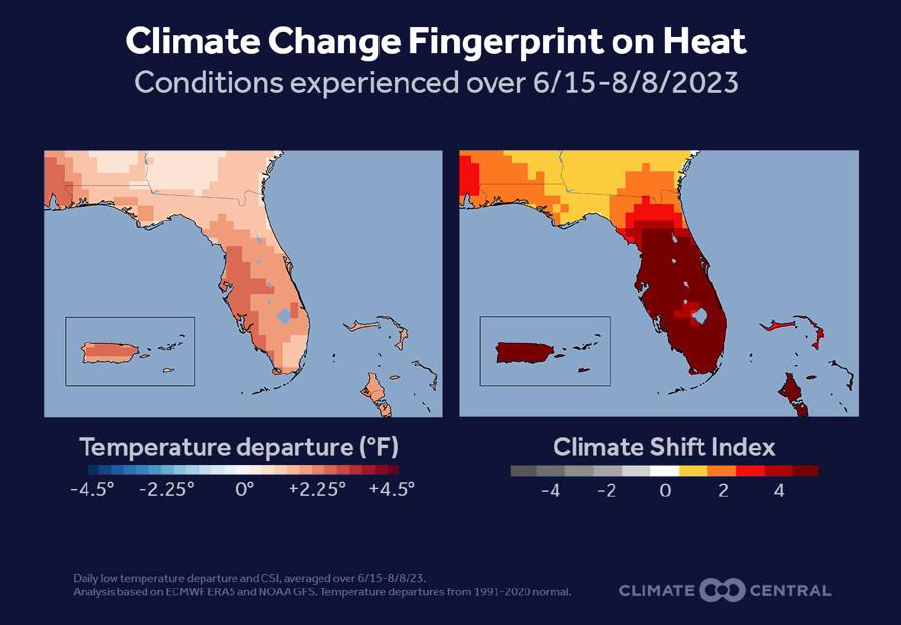 Record-setting warm overnight temperatures in Florida and Puerto Rico were made at least five times more likely by climate change, according to a new attribution analysis by Climate Central.
Record-setting warm overnight temperatures in Florida and Puerto Rico were made at least five times more likely by climate change, according to a new attribution analysis by Climate Central.
The climate-fueled heat exposed millions of people to potential heat-related health impacts as well as the economic burden of increased energy costs.
Read the full analysis here.
- "Plant a seed" - A meteorologist discusses the importance of talking about climate change
- With climate change no longer easy to dismiss, Florida has the opportunity to do things differently
- NC State Will Lead New Southeast Climate Adaptation Science Center Consortium
- Teen activist plants mangroves to combat climate change












